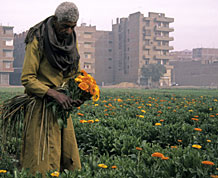Job Vacancy_ Technical Advisor / head of component
A. ContextÂ
- The Participatory Development Programme in Urban Areas (PDP) is an Egyptian-German development project implemented in cooperation between the Egyptian Ministry of Planning and the Deutsche Gesellschaft für Internationale Zusammenarbeit (GIZ) GmbH (German Development Cooperation). The PDP was launched as an Egyptian-German Cooperation Programme (01/2004 until 12/2015), which is currently in its third implementation phase (2010-2015) in cooperation with the Bill and Melinda Gates Foundationâ as a co-financing partner in addition to the core-financing of the German Federal Ministry for Economic Cooperation and Development (BMZ) and the contributions by the Egyptian side. An additional finance is under preparation from the EU as a Delegated Cooperation and for creation a fund for the implementation of concrete measures.
- The PDP focuses on the upgrading of informal areas in Greater Cairo Region by introducing and supporting the implementation of participatory methodologies for urban upgrading with public administration and civil society organizations to improve service provision and thus living conditions in an integrated manner to alleviate urban poverty.
- The on-going phase of the Programme has as an overall objective of: âPublic administration and civil society organizations improve services and environmental conditions for the poor urban populationâ with the following four components.
- Component 1 focuses on the dissemination of participatory urban development procedures and tools and their institutional anchorage.
- Component 2 focuses on ways and means to increase the resilience of informal areas to climate change.
- Component 3 has the objective of establishing an integrated and community-based solid waste management system in two selected areas (Khosoos and Khanka, Qalyubeya Governorate) with the Bill and Melinda Gates Foundation.
- Component 4 is tackling the improvement of the living conditions in four unplanned informal urban areas (two informal areas each in Cairo and Giza Governorates) through funds implemented according to EUâs grant procedures taking into account the active participation of youth, women, civil society organizations and private sector.
- As an additional indirect component PDP implement a Youth Fast-track Measure within the same areas. A fund for Local Initiatives is managed by PDP with finance from funds by the Egyptian Government.
A.    Responsibilities
The professional advisor has the following overall responsibilities:
- managing component 1 that forms part of the programme objectives, team agreements and/or agreements with the superior
- assisting project/programme initiatives to provide professional advisory services to and cooperate with a broad range of target groups (government officials, national training institutes, universities, international organisations, and civil society organisations)
- innovation and knowledge management with regard to component 1
 B.    Tasks
1.     Strategic functions:
The Senior Technical Professional will be responsible for:
- Ensure the elaboration and support of the implementation of an organisational and capacity development strategy for the programme in the phase 2012 â 2016. This strategy should build on the programmeâs previous conceptual and empirical efforts in this field, and in the same time respond to the new partnersâ landscape and changing policy environment.
- Ensure effective communication of the Capacity Development (CD) and institutionalization strategy to other programme components as well as to relevant partners of the programme, collect feedback and amend the strategy accordingly as appropriate.
- In cooperation with the component CD advisors, oversee, within the agreed-upon strategy, the design of capacity development packages and material targeting both civil society and governmental partners at the governorate and district levels. These packages capitalize and put into use existing capacity development material at PDP. The Head of Component is responsible for developing, planning and coordinating any capacity development activity carried out within PDP including its components and its partners.
- Follow up closely the implementation of any capacity development activities or programmes within the agreed upon strategy and give backstopping and orientation to these activities.
- In close cooperation with the GIS seniors advisor, overlook the GIS unit of PDP and maintain, and support the development of ready-to-use strategies and technical concepts, including guidelines, manuals and procedures
- In cooperation with the component staff, develop detailed work plans for the component in coordination with the Programme Coordinator and other component leaders.
 2.     Advising the partner institution(s)
The Advisor
- Develop and maintain cooperation with relevant entities at the central government, governorate and district levels towards institutionalizing participatory upgrading tools, processes and practices within their administrative structures, decision-making and budget allocation mechanisms and implementation and monitoring mandates and modalities. These include, but are not limited to, Ministry of Planning (MoP), Ministry of Local Development (MoLD), Informal Settlements Facility (ISDF), General Organization for Physical Planning (GOPP), other ministry, the governorates of Cairo and Giza, UUUs and the four districts, and other departments.
- Supports in the communication of capacity development and institutionalisation strategies to PDPâs partners,
- Identify the need for any external technical input to the component and design Terms of References for consultancies and/or contracting out of technical inputs in light of the capacities within the programme and its partners. The Head of Component is also responsible to manage these technical inputs to ensure delivery of products and accomplishment of assignments.
- Assists and monitors the development and implementation of project/programme plans and activities in close consultation with counterparts,
- Contributes to preparing and implementing the coordination process, joint programme activities and work at the regional level,
- Deals with the design, preparation and implementation of workshops, seminars and other events on issues connected to urban development,
- Develops and organises quality assurance measures and suggests necessary changes, improvements and initiatives.
3.     Networking and cooperation
The Advisor
- Develop cooperation with national training institutes, such as the Institute of National Planning (INP), Urban Training Institute (UTI), Saqqara Training Centre, and national NGOs with CD, Civic Engagement Centres, on institutionalization of capacity development packages to ensure replication of the application of participatory upgrading tools on a national scale.
- Supports and maintains cooperation with relevant governmental entities, especially at governorate and district level towards institutionalising participatory upgrading tools, processes and practices within their administrative structures, decision-making and budget allocation mechanisms and implementation and monitoring mandates and modalities. These include, but are not limited to, the governorates of Cairo and Giza and the four districts where small-scale measures will be implemented.
- Supports establishing cooperation ties with universities, such as Cairo University, Ain Shams, Asyut, Alexandria, etc. on the institutionalisation of capacity development packages to ensure the replication of participatory upgrading tools on a national scale.
- Supports cooperation, regular contact and dialogue with partners, local or international, and other donor groups such as (DPG-UD) to improve and maintain good working relationships.
- Communicates local interests and efforts, forwards these and encourages sharing ideas and information for the benefit of the programme.
 4.     Knowledge management
The Advisor
- Lead the different components inside PDP on setting a strategy for knowledge management where existing and new tools and manuals get institutionalised amongst the different partners inside the government different tires and the civil society organisations.
- Identify opportunities for experience exchange and dissemination of PDP experience in capacity development and institutionalization in Egypt and abroad to ensure visibility of PDP work.
- Ensures knowledge transfer to programme information.
- Develops ready-to-use strategies and technical concepts, including guidelines, manuals and procedures.
- Draws up reports and presentation documents.
- Prepares appropriate input for various programme reports including annual reports, and contributes to the other reports required by the programme manager and GIZ Head Office
- Assists with research activities and studies on issues which benefit joint programmes.
- Contribute to the knowledge management of PDP (Publications, elaboration of tools and instruments, training manuals, presentations on national and international congresses.
5.     Coordination tasks
The Advisor
- Manage human and material resources available to the component and advice the Programme Coordinator on resources needs well in advance.
- Takes over the leadership responsibility for the technical staff of the component.
- Manage the component administrative and technical operations in close cooperation with PDP administration staff and the Programme Manager.
- Assists with general project planning and develops project concepts including preparation, organisation and moderation of planning exercises and their implementation, management, monitoring, quality management, evaluation, communication and documentation
- Coordinates relevant project activities at local level in consultation with the manager and in cooperation with the partners, both as regards implementation and preparing organisational aspects
- Compiles the relevant information for joint activities and assignments
- Handles order management on behalf of GIZ (e.g. offer preparation, impact monitoring, project progress review, reporting)
6.     Other tasks
The Advisor
- Has to take over additional tasks on request, even they are not mentioned within this job description. Normally this should be agreed with the Programme Coordinator.
 C.    Required qualifications, competences and experience
Qualifications
- Masters/MSc or higher in urban development (architecture, urban planning), geography, social or political sciences with a focus on development studies or similar field in the urban context.
D.    Professional experience
- At least 10 yearsâ professional experience; from this at least 3 years in a comparable position.
E.    Other knowledge, additional competences
- Very good working knowledge of IT technologies (related software, phone, fax, email, the internet) and computer applications (e.g. MS Office)
- Fluent written and oral knowledge of the English and Arabic languages; working knowledge of German would be an asset
- Excellent communication and organisational skills
- Capacity to work well in a team
- Ability to work under pressure and flexibility
- Knowledge of GIZ policy and tools and previous GIZ-work experience are desirable
- Willingness to upscale as required by the tasks to be performed â corresponding measures are agreed with management.
 F.    Application procedure
The following documents should be included in the application:
- Motivation letter (including information on the expected salary)
- Updated curriculum vitae with actualised photo
- Two reference letters
The position can be filled as soon as possible, latest by July, 15th, 2013.
The working location is in the Ministry of Planning on Salah Salem Street, Nasr City.
Kindly send your applications by e-mail to Ms. Hanan Malek ([email protected]) with copy to Dr. Günther Wehenpohl ([email protected]), Deadline for applications is Sunday 17th of June, 2013.
Celebrating World Environment Day in Khosoos
Â
An environmental awareness campaign was organised in Khosoos last week to mark World Environment Day. Awareness activities, such as cleaning the streets around the schools, planting trees, and painting school walls took place. At the end of the day there was an awareness session for all the community members about World Environment Day.

The purpose of the campaign was to create awareness and involve the local community in activities to improve the living and environmental conditions in Khosoos. 25 students from the area participated in the event, all of them âEnvironmental Guardsâ who have been trained by the Participatory Development Programme in Urban Areas (PDP) to take care of the environment inside their schools.
âWe need to teach young people about hygiene so when they grow up they make sure their neighbourhoods are clean. Hygiene is very important to lifeâ, said Ahlam Abdel-Meguid Mohamed, a 12-years old student and environmental guard at Khosoos Primary School.
The event was organised by the solid waste management component of the PDP in cooperation with the city council and the NGO âFriends of the Environmentâ. The city council and Friends of the Environment contributed with vehicles to collect the garbage, workers and soil for the garden that was planted outside the school complex. Among the attendees was also Khosoos city chief Abdel-Barah Hasheesh.
The PDPâs Solid Waste Management (SWM) activities focus on establishing an integrated and community-based solid waste management system in two cities in Qalyubya: Khosoos and Khanka. The aim is to recover valuable resources that exist in waste, by building sustainable and environmentally sound methods for composting and recycling.
PDP Coordinator and SWM Manager Dr. Günther Wehenpohl said: âOur aim is to build trust among different actors in the solid waste management system, while at same time improving environmental conditions for people living in Khosoos.â
The PDP is an Egyptian-German development programme implemented by the Ministry of Planning (MOP) and the Deutsche Gesellschaft für internationale Zusammenarbeit (GIZ) on behalf of the German Federal Ministry for Economic Cooperation and Development. Its aim is to enhance the living conditions for the poor urban population of Greater Cairo.
PDP targets the Greater Cairo Region where 60% of the people live in unplanned, densely populated areas that lack basic services and social infrastructure, and are suffering from environmental pollution.
Â
More information about the Participatory Development Programme can be found on: www.egypt-urban.net
For further enquiries please contact: [email protected]
Four Local Area Dialogue Committees created!
Four Local Area Dialogue Committees (LADCs) have been created following community elections in Ain Shams and Ezbet el-Nasr in Cairo, Markaz El-Abhath/ Warraq and Masaken Geziret El-Dahab in Giza.
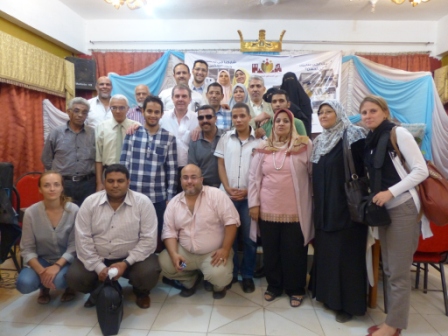
The committees will be responsible for monitoring and following up on community needs. They represent the community when it comes to interactions with the programme.
Community meetings were held to form LADCs in each area. Each candidate had the chance to introduce and speak about themselves and the activities they had been involved in, followed by elections and vote counting. That process took place after an initial presentation on LADC roles and objectives. Attendees interested in joining the Committee nominated themselves according to different community groups. In all four areas the evening ended successfully with the formation of an LADC.
âBecoming a member of the LADC was a great experience for me. I am grateful to GIZ for providing such an opportunity for me as a woman to participate in developing my communityâ said Soad El Sawy, a community volunteer and now a LADC member in Ain Shams.
Each LADC comprises of 20 members, representing NGOs, community services such as (schools, youth centres and hospitals), business people, elected local council members, community leaders, as well as any other residents interested in developing their community.
âThe LADCs will act as a community voice in communicating both from the people their needs and aspirations and to the people information about community development progressâ said Michael Heathcote, PDP Fund Manager.
The selection process will be repeated every year.
Ezbet El-Nasr Youth Network mark their area
The Ezbet El-Nasr Youth Network worked closely with the District authority to design and produce traffic signs to mark their community with the name the community identifies itself with.
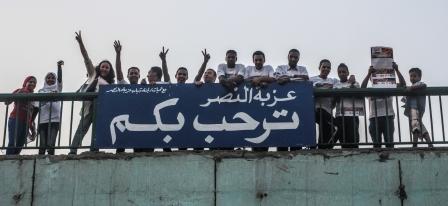
In a community ceremony, the traffic signs were inaugurated as a first step in a new future, marking the area as âEzbet El-Nasrâ. To outsiders the area was previously known only by the Jewish cemetery bordering it. The aim of the youth initiative was to give a stronger identity to the community living in the area.
The ceremony was attended by Dr. Nemaat Saty, Head of Centeral Department for Parliament and Civic Education, Ministry of Youth and Dr. Azza al Doury from the same department, Basateen District Chief Tarek Al Yemini, and Hesham El Zeftawi and Sundus Balata from the Egyptian-German Participatory Development Programme in Urban Areas (PDP).
Regina Kipper, Coordinator of the measure âPromotion of Youth Participation in Informal Areas in Greater Cairoâ at PDP said:Â âThe establishment of these signs is not only a great way to demonstrate community identity, but also a great initiative from the youth network of Ezbet El-Nasr.â
Four youth networks â including the network of Ezbet El-Nasr â were established in 2011 as part of the Youth Fast Track Measure which is financed by the German Ministry for Economic Cooperation and Development (BMZ) and implemented by the Deutsche Gesellschaft für Internationale Zusammenarbeit GmbH (GIZ). The measure aims at empowering young Egyptians between the ages of 18 to 35, enabling them to participate effectively in planning and decision-making processes in their local communities.
The youth networks were established in four informal areas in Greater Cairo (Masaken Geziret El-Dahab and Markaz El-Abhath / Warraq in Giza Governorate, and Ain Shams and Ezbet El-Nasr in Cairo Governorate). The aim of the networks is to give young Egyptians the chance to play a stronger role in their communities and enable them to engage in a constructive dialogue with the local authorities. Through dialogue platforms, the young people are currently designing and planning development initiatives together with the local authorities to benefit their local communities.
Ezbet El-Nasr is an informal settlement on desert and state-owned land, with over 72.000 inhabitants. It is formally attributed to the southern districts of Cairo and the Al-Basateen district. It is bound by the Ring Road to the South, the Autostrad to the East and a slaughterhouse to the North. A historic Jewish cemetery is embedded into its western parts.
The history of the areaâs construction goes back more than 40 years and is strongly linked to an influx of rural migrants from Fayoum, Beni Sweif, Menia, Asyout, Sohag and Qena. Ezbet El-Nasr is in many ways physically and socially segregated from the rest of the city. Although many basic services can be found in the area, the quality and maintenance of these are often unsatisfactory.
The PDP is an Egyptian-German development programme, working to upgrade informal settlements in Greater Cairo â such as Ezbet El-Nasr â in ways that involve the residents of those areas. The overall aim is to enhance their living conditions and alleviate urban poverty through improving local services and environmental conditions. Approximately 60% of people in Greater Cairo live in unplanned, densely populated areas that lack basic services and social infrastructure, and are suffering from environmental pollution.
Ministry of State for Environmental Affairs and PDP agree to jointly work on tackling environmental problems in Cairoâs informal areas
The Ministry of State for Environmental Affairs (MSEA) and the Participatory Development Programme in Urban Areas (PDP) have agreed to jointly work to address Egyptâs environmental challenges in informal urban areas.
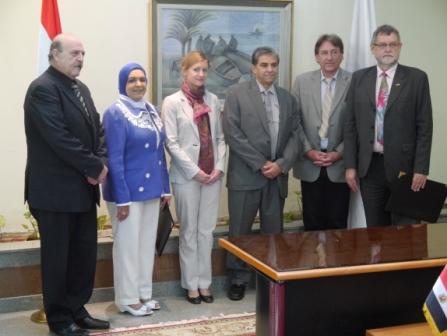
On Monday 13 May 2013, the Ministry of State for Environmental Affairs and the Participatory Development Programme in Urban Areas (PDP) signed a cooperation agreement. The new partnership will address some of the most pressing environmental challenges facing the country, namely solid waste management and climate change.
The PDP is an Egyptian-German development programme, working to upgrade informal settlements in Greater Cairo Region, in ways that involve the residents of those areas. The overall aim is to enhance the living conditions of the citizens and alleviate urban poverty through improving local services and environmental conditions.
In this context the PDP focuses on establishing an integrated community-based solid waste management system in two selected areas in Khanka and Khosoos cities in Qalyubeya Governorate. In addition to this, the programme works on increasing informal area populationsâ ability to cope with the effects of climate change, focusing on four areas in Greater Cairo (Masaken Geziret El-Dahab and Markaz El-Abhath / Warraq in Giza Governorate, and Ain Shams and Ezbet El-Nasr in Cairo Governorate).
PDP Programme Coordinator Dr. Günther Wehenpohl said: âOur overall goal is to improve living conditions in selected informal areas. This can only be done by also addressing the environmental problems of these areas and in partnership with the Egyptian side.â
The MSEA together with the Egyptian Environmental Affairs Agency (EEAA) will ensure the activities are in line with national strategies, link with relevant national partners and support awareness raising campaigns on environmental issues.
Approximately 60% of people in Greater Cairo live in unplanned, densely populated areas that lack basic services and social infrastructure, and are suffering from environmental pollution.
The focus of the cooperation agreement is in accordance with the national priorities of the government of Egypt and the latest negotiations between the governments of Egypt and Germany.
Ecocem (Lafarge) and GIZ agree to pilot new waste management solutions for Egypt
Ecocem (Lafarge) and the German Development Cooperation (GIZ) have agreed to jointly work to pilot new solutions addressing both Egyptâs waste management problems and the emerging energy crisis.
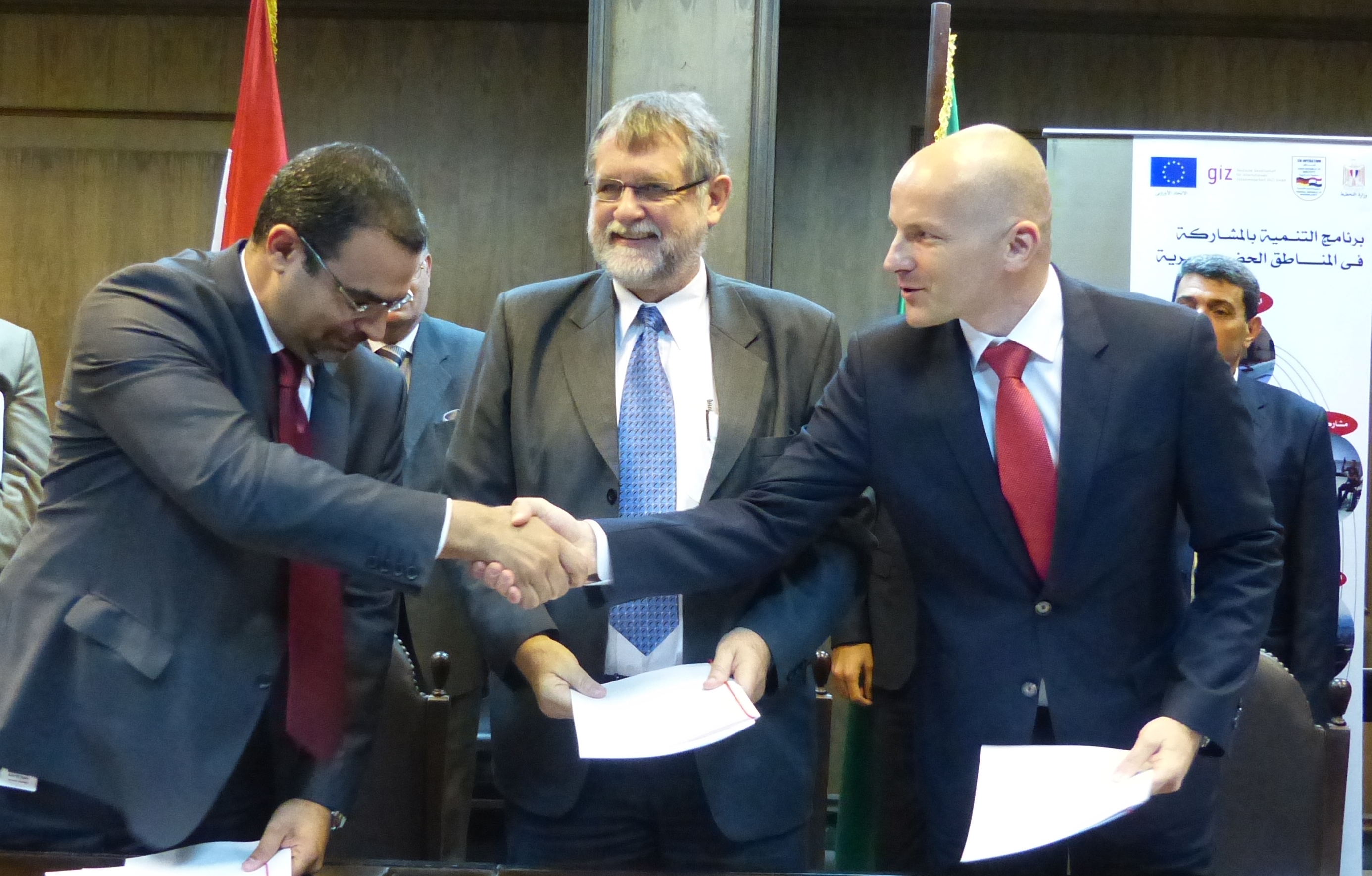
On Thursday 28 March 2013, Ecocem â a subsidiary company of Lafarge Group â and GIZ in partnership with Qalyubeya Governorate signed a cooperation agreement. This partnership will address some of the waste management problems in Qalyubeya Governorate while at the same time finding alternative solutions to the growing energy crisis facing industries in Egypt while creating a new value chain for the local communities.
Under the Public-Private-Partnership (PPP) concept, private sector companies and public sector development cooperation work hand in hand, achieving a win-win-situation and creating new possibilities for positive development impulses.
GIZ Programme Coordinator Dr. Günther Wehenpohl said: âThis cooperation is a great example of public and private organisations joining efforts to work together on finding solutions to Egyptâs environmental problems, while at the same time enhancing economic opportunities for poor urban populations.â
This cooperation agreement builds on the existing partnership between GIZ and Qalyubeya to rehabilitate an old recycling facility. Within this context a new processing line to produce Refuse Derived Fuel (RDF) from waste materials – which can be used as an alternative source of fuel in cement factories – will be built. This facility will create more than 50 job opportunities while also benefiting informal waste collectors and recyclers who will work on separating recyclable material such as plastics and metals.
Lafarge is the world largest producer of building materials and is a market leader in Egypt. Lafarge Cement Egypt has been the pioneer in providing effective and environmentally reliable thermal treatment solution in Egypt with a great success and proven track record. Ecocem Industrial Ecology Egypt is Lafargeâs Industrial Ecology unit in Egypt responsible for developing, sourcing and pre-treating solutions to facilitate the recovery of wastes to alternative fuels materials by Lafarge Cement plant that co-processes them with full compliance with international environmental standards and sustains its undisputed high quality cement products. Ecocem will source the RDF produced at the facility while also providing technical support for the operation of the RDF processing line. Part of the revenues generated from the sale of RDF will be reinvested by Qalyubeya Governorate to enhance the waste collection and transportation systems in the cities of Khosoos and Khanka.
GIZ is supporting Qalyubeya Governorate since 2010 through the Participatory Development Programme in Urban Areas (PDP) to develop integrated community-based waste management systems in two cities, Khosoos and Khanka, within the governorate.
This agreement also entails the cooperation between Ecocem-Lafarge and GIZ in conducting research about the utilization of RDF, initiating stakeholder consultations as well as dissemination of technical knowledge. This will primarily be done in cooperation with the National Solid Waste Management Programme (NSWMP). The NSWMP, which is also supported by the German government, aims to support the Egyptian government in developing the necessary institutional, legal and organizational structures for waste management at the national level as well as in four other governorates. In the opinion of Joachim Stretz, GIZ Programme Coordinator of the NSWMP, âThis joint approach can deliver necessary experience and knowledge to tackle the next steps in developing an improved and sustainable waste management system suitable for Egyptâ.
GIZ is a government-owned enterprise which supports the German government in achieving its objectives in field of international development cooperation.
200 participate in first Egypt Urban Futures workshop
200 representatives of government, civil society, academia and international donors took part in the first Egypt Urban Futures workshop, a new workshop series, organised by the Participatory Development Programme in Urban Areas (PDP), together with UN-Habitat and the Centre d’Ãtudes et de Documentation Ãconomiques (CEDEJ).
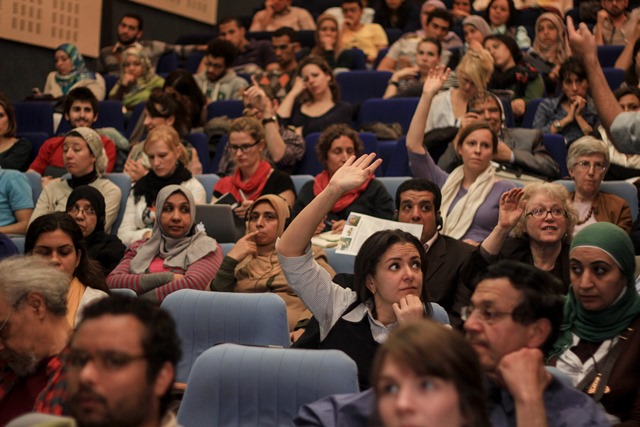
The first session on the topic of âInformal Areas after 25 January 2011â took place on 11 March 2013 at the French Institute in Cairo. The workshop examined the changes in informal neighbourhoods since the outset of the revolution and aiming to define new strategies of territorial action and aid to development.
The Egypt Urban Futures series has been initiated to build a platform to exchange approaches, experiences, best practices and opinions concerning urban development for all stakeholders engaged in the field.
The first session received very positive feedback from participants, and revealed consensus on the need for stronger cooperation in the field of urban development in Egypt.
The next workshop will take place in August 2013.
Egyptian delegation visits Morocco and Tunisia as part of study tour on solid waste management
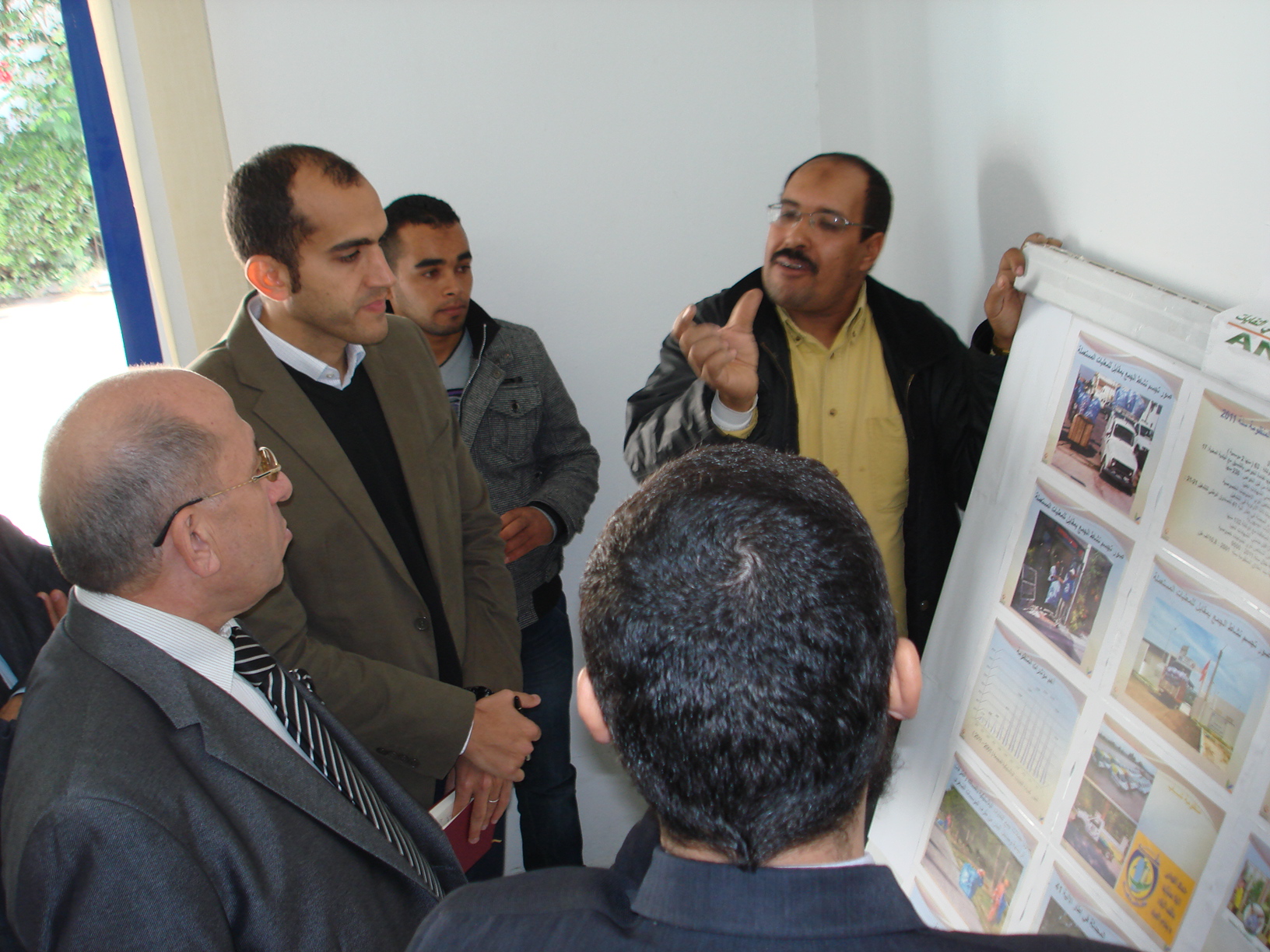
An Egyptian delegation comprised of representatives from Qalyubeya Governorate and the Participatory Development Programme (PDP) visited Tunisia and Morocco from 1 to 9 December 2012 as part of a study tour on solid waste management.
The goal of the tour was to exchange information and experiences in the field of municipal solid waste management, to build on good practices in the region and to form partnerships between cities in the field of waste management.
During the tour the Egyptian delegation got to meet with representatives of government on the central and local level as well as private sector companies in both countries. The delegation also visited recycling centers, landfills and treatment facilities.
The main topics covered were:
- Institutional Strengthening and Establishment of the National Agency for Waste Management (Tunisia)
- System recovery of plastic packaging (ECO-LEF) (Tunisia)
- Landfill biogas, leachate treatment and CDM project (Tunisia)
- Planning and organisation within municipalities (Morocco)
- Managing and monitoring the private sector (Morocco)
- Opportunities for partnerships between cities (Morocco)
The most important lessons learnt on the study tour were the significance of strong institutional set up for waste management at the central and local level for effective waste management, the need for integration of the informal sector and the importance of innovative means for covering costs of services. The municipalities of Rabat and Tunis agreed to form ongoing partnerships with the governorate of Qalyubeya and to continue to exchange information and expertise after the tour.
The Egyptian delegation was comprised of decision makers and technical staff working in the field of municipal solid waste management in Qalyubeya governorate and members of the PDP solid waste management team. The Solid Waste Management component of the PDP seeks to support stakeholders in Qalyubeya governorate and the cities of Khosoos and Khanka to develop integrated community based waste management systems.
The study tour was organised by the PDP together with SWEEP-Net, the regional solid waste exchange of information and expertise network in Mashreq and Maghreb countries.
Khosoos pupils raise environmental awareness in their neighbourhood
100 students and 30 teachers from six schools in Khosoos took part in an environmental campaign at Khosoos Primary School on 23 and 24 November 2012.
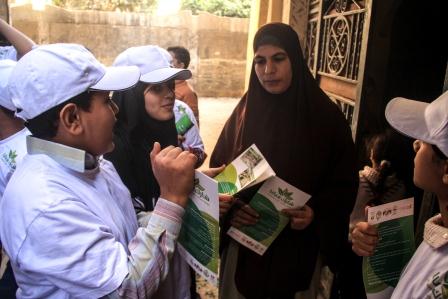
Students talk to residents about their campaign
As part of the campaign, students painted the walls with environmental messages, cleaned up the garbage in their school yard, planted trees, and presented their own plays and artistic performances around environmental topics. Students who were trained on paper recycling through the programme were also able to showcase products they produced from used school paper such as bookmarks, decorations, bags and folders.
The event came as part of the awareness raising and community mobilisation action plan â an integral part of the solid waste management component of the Participatory Development Programme in Urban Areas (PDP).
The school suffers from neighbours throwing garbage from their balconies into the school yard. In an effort to make them more aware of the problem, students went around local residentsâ houses, informing them about the campaign and their vision for their school environment, and asking them to help them keep their schoolyard clean.
Zeinab Ibrahim, a social worker at the school, said: âThe aim of this weekendâs camp is to clean up the garbage to make the school a nicer place and ask to neighbours to stop dumping their garbage inside the school.â
Different participants contributed to the success of the camp: The school bought the trees that were planted while Khosoos city council removed the piles of garbage from the school yard.
14-year-old student Ahmed from Khosoos said: âWe should let our parents, neighbours and other students know about the importance of keeping our school and environment clean. People have responded very positively to our campaign. We are starting with this school and hopefully we can extend it to others, too.â
Khosoos generates around 400 tons of waste daily, half of which is piled in streets, vacant lands and inside schools, causing various environmental and health problems. The programme seeks integrated solutions to the problem â all of which are only sustainable with community participation.

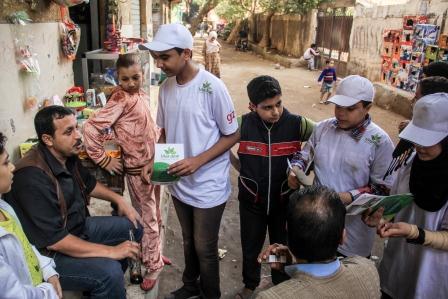
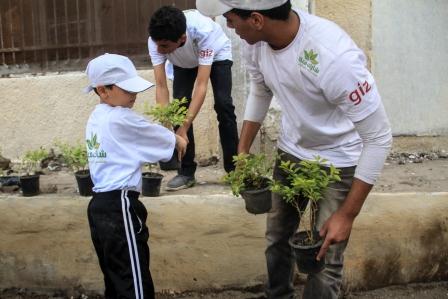
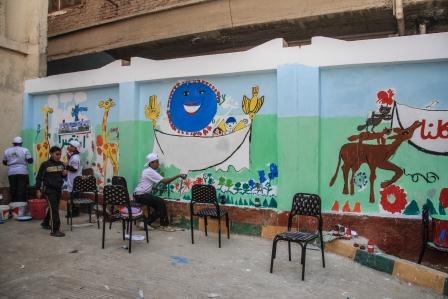

Photographer: Mosa’ab Elshamy
Giza Governorate and PDP sign agreement to improve the living conditions of people in two informal areas in Giza until 2016
Giza Governor Dr. Ali Abdel-Rahman and Dr. Günther Wehenpohl, Coordinator of the Participatory Development Programme in Urban Areas (PDP) have signed an agreement to jointly work to improve living conditions for residents in Gizaâs informal areas over the coming four years.
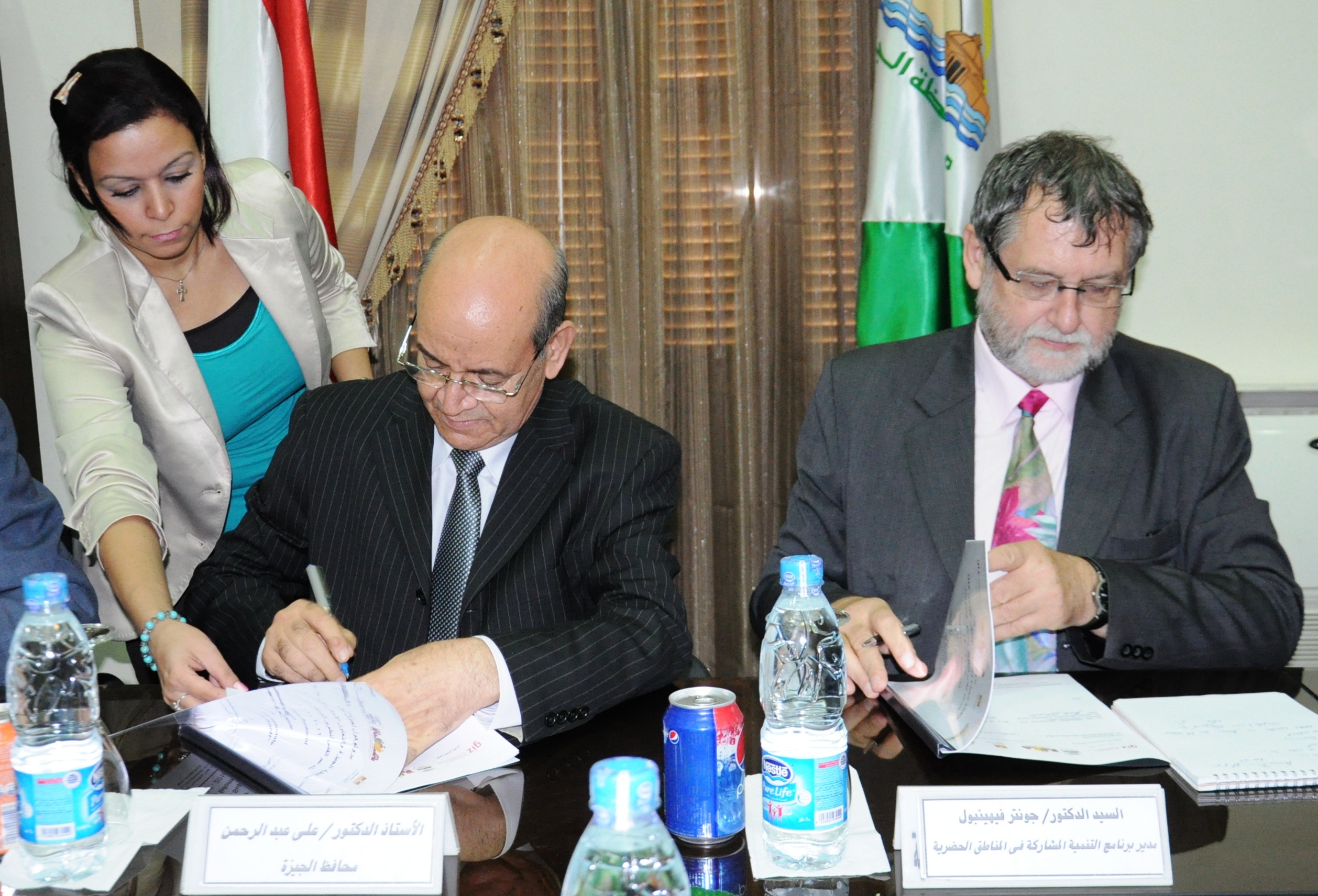
The signing ceremony took place in Giza Governorate on Tuesday, 23 October 2012.
Both sides agreed to further promote the institutionalisation of participatory methods in dealing with Gizaâs informal areas as well as the capacity building of local administration employees. The protocol also stresses the importance of participatory development tools in the context of the Egyptian Revolutionâs demands for citizensâ participation rights, social justice and inclusion.
Dr. Abdel-Rahman said: âThe new protocol comes in the context of a fruitful cooperation between the governorate and GIZ. It follows the first successful experience in participatory development in Boulaq El-Dakrour between 2004 and 2007 and the subsequent establishment of an urban upgrading unit in the governorate.â
As a next step, focus group discussions with local residents will be carried out over the coming weeks to establish the priorities for development in the two target areas Masaken Geziret El-Dahab and Merkas El-Ibhath. The experiences and lessons learned from both areas will be used by the governorate to apply in other informal areas across the governorate.
